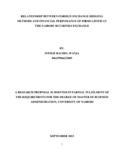| dc.description.abstract | A number of Kenyan companies that are listed at the NSE have transactions both in Kenya Shillings and in Foreign Currencies such as the Japanese Yen, United States Dollar, British Pound or the European Union Euros. However, their cash-flows are in Kenya Shillings and they are required to pay these loans in the respective currencies in which they were borrowed. The prices of these foreign currencies fluctuate against the shilling and there is no constant rate that is assured for future transactions. Some companies have tried to employ forward covers to reduce their risk but they are either difficult to source because their obligations are too big to be met by one bank or too expensive to finance due to the guarantee cover of promised futuristic prices. As a result many institutions do not hedge their FX exposures, and are running significant exchange rate risks and losses at the time of paying back their loans.
The study analyses the hedging methods used by various companies such as forwards, futures, swaps and options to curb against foreign exchange losses. A regression analysis is used to establish the relationship between those companies that employ any of the hedging methods and how they affect the company’s book and NSE share price performance.
The results of the study confirm that those companies that employ hedging methods perform better, sometimes from loss making situations to profitability. The study concludes that listed companies that have foreign currency transactions should employ hedging mechanisms to plan for forecasted future transactions that entail purchase of foreign currency to meet their foreign currency obligations | en |

